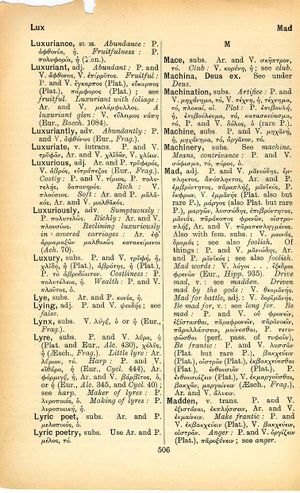mad
Τραφὲν ὄρεσι καὶ φάραγξιν ἀγρίαις, κήρυξ πέφυκα τῆς λόγου ὑμνῳδίας. Φωνήν μὲν οὐκ ἔναρθρον, εὔηχον δ' ἔχω (Byzantine riddle) → Raised in the mountains and wild ravines, I have become the herald of hymns that are sung. I have no articulate voice...
English > Greek (Woodhouse)
adj.
P. and V. μανιώδης, ἔμπληκτος, ἀπόπληκτος, Ar. and P. ἐμβρόντητος, παραπλήξ, μανικός, P. ἔκφρων, V. ἐμμανής (Plat. also but rare P.), μάργος (also Plat. but rare P.), μαργῶν, λυσσώδης, ἐπιβρόντητος, μανιάς, παράκοπος φρενῶν, οἰστροπλήξ, Ar. and V. παραπεπληγμένος. Also with fem. subs.; V. μαινάς, δρομάς; see also foolish. Of things: P. and V. μανιώδης, Ar. and P. μανικός; see also foolish. Mad words: V. λόγοι . . . ἔξεδροι φρενῶν (Eur., Hipp. 935). Drive mad, v.: see madden. Driven mad by the gods: V. θεομανής. Mad for battle, adj.: V. δοριμανής. Be mad for, v.: see long for. Be mad: P. and V. οὐ φρονεῖν, ἐξίστασθαι, παραφρονεῖν, παρανοεῖν, παραλλάσσειν, μαίνεσθαι, P. τετυφῶσθαι (perf. pass. of τυφοῦν). Be frantic: P. and V. λυσσᾶν (Plat. but rare P.), βακχεύειν (Plat.), οἰστρᾶν (Plat.), ἐκβακχεύεσθαι (Plat.), ἐνθουσιᾶν (Plat.), P. ἐνθουσιάζειν (Plat.), V. ἐκμαργοῦσθαι, βακχᾶν, μαργαίνειν (Aesch., Frag.), Ar. and V. ἀλύειν.

